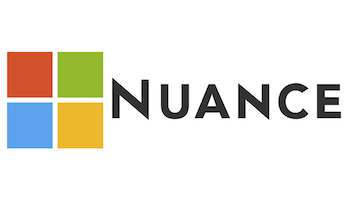 When Microsoft announced its agreement to purchase all of the stock in Nuance Communications for $19.7B last week, all eyes were on healthcare. Kane Simms of VUX World explains the deal in great detail here. He highlights that Microsoft’s overall objective is to “dominate the AI provision and cloud infrastructure in the $10 TRILLION healthcare industry.” Within that eye-popping number, Microsoft CEO Satya Nadella believes that Nuance’s ACI approach has a near-term opportunity to open a more modest “$500 billion TAM [total available market].”
When Microsoft announced its agreement to purchase all of the stock in Nuance Communications for $19.7B last week, all eyes were on healthcare. Kane Simms of VUX World explains the deal in great detail here. He highlights that Microsoft’s overall objective is to “dominate the AI provision and cloud infrastructure in the $10 TRILLION healthcare industry.” Within that eye-popping number, Microsoft CEO Satya Nadella believes that Nuance’s ACI approach has a near-term opportunity to open a more modest “$500 billion TAM [total available market].”
Spending a mere $20 billion for the opportunity to be a category leader in a $500 billion marketplace seems like an easy choice for Microsoft, which has roughly $175 billion of cash on its balance sheet. Let’s rule out the idea that Microsoft is buying Nuance solely for its portfolio of patents and intellectual property in the speech processing and AI. Microsoft has enough of its own cognitive resources, especially LUIS and the Bot Framework. There is a lot of overlap in terms of tooling and core AI versus Nina and Mix.
In his three years as CEO of Nuance, Mark Benjamin has done a successful job of pruning away operations that were perceived as non-core. Automotive-oriented speech processing personnel, assets and customers were spun off into Cerence more than two years ago. It is now in the process of divesting its medical transcription and “EHR go-live” businesses to Assured Healthcare Partners and Aeries Technology Group. That leaves the Enterprise Group, with a focus on speech, natural language understanding and artificial intelligence to automate customer service, and the Healthcare Group which places emphasis on “clinical language understanding solutions that improve the clinical documentation process.” Note that the Enterprise Group also has formidable sets of products and services for conversational authentication and fraud prevention.
Ambient Clinical Intelligence: A Vertical Model for AI-Infused CX
It is surprising that the word “ambient” was not brought up in either Satya Nadella or Mark Benjamin’s webcast on the day of the deal. “Ambient Clinical Intelligence” (ACI) is the name that Nuance gives to the addition of “ambient sensing technology” to the the latest version of Nuance Dragon dictation software. It has been developing or trialing ACI for more than two years, with a focus on creating a better “patient-physician experience” by making it possible for a doctor to look up from the ever-present laptop that is used to populate electronic health records and make genuine eye contact with patients. Microsoft and Nuance now offer it as the Nuance Dragon Ambient eXperience (DAX) and it is core to defining an improved “patient-physician experience.” Nuance was one of the first companies to play up the idea of the purpose-driven capturing of spoken words in doctors’ offices to improve the quality of healthcare. Applying AI to the process of documenting discussions with patients or populating electronic health records frees doctors up to spend more quality time with patients.
Zooming out from the physician’s office, we expect the spirit of DAX permeating other verticals. Healthcare presents a slew of challenges that other verticals, like retailing, banking, insurance, government and all manner of services must tackle. There are high levels of sensitivity to the privacy of personal information which are often baked into laws, regulations or guidelines that call for equally high levels of security. Microsoft has formidable chops when it comes to security. Nuance’s long-standing investment in biometrics and AI-infused authentication will augment or complement its offerings. Both are areas where Microsoft’s strengths in OS, Applications, “The Cloud” opportunities”. Voice and behavioral biometrics is the sleeping giant because Microsoft’s infrastructure in businesses includes Active Directory, a resource that is the universal source of corporate identity.
Nuance brings some very formidable IP, tools and frameworks for biometrics-based and behavioral authentication. In concert with Microsoft Dynamics (for customer facing instances) and Active Directory (for employee authentication) expect to see an improved model for Seamless, yet strong, authentication is both in contact centers and for access to corporate VPNs.
Categories: Conversational Intelligence, Intelligent Assistants, Intelligent Authentication, Articles

 Beyond the Basics: How AI Is Transforming B2B Sales at TP
Beyond the Basics: How AI Is Transforming B2B Sales at TP  Voice AI Agents Redefine CX: Trends, ROI, and Strategies for 2025
Voice AI Agents Redefine CX: Trends, ROI, and Strategies for 2025  Why Voice AI Is Foundational for Enterprise Innovation (Webinar)
Why Voice AI Is Foundational for Enterprise Innovation (Webinar)  Trust and Safety in AI Voice Agents: Insights from Gridspace’s Approach
Trust and Safety in AI Voice Agents: Insights from Gridspace’s Approach